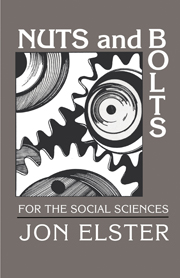XI - Equilibrium
Published online by Cambridge University Press: 05 June 2012
Summary
EARLIER I said that the social sciences have to explain why we are not in the state of nature. Another challenge is to explain why societies have a modicum of order – why they do not offer “a tale told by an idiot, full of sound and fury, signifying nothing.” This phrase from Macbeth evokes a different kind of anarchy than that suggested by Hobbes's description of life in the state of nature, as “solitary, poor, nasty, brutish and short.” It conveys a lack of coordination rather than a lack of cooperation, chaos rather than nastiness. In the preceding chapter we looked at some ways in which people's plans can be thwarted. But no society could work if everybody's plans were thwarted all the time. Universal frustration of plans would be chaos.
Each problem – why we are not in the state of nature and why we are not in a state of chaos – could be resolved in two ways. On the one hand, cooperation and coordination may emerge by decentralized, uncoerced action. This is the topic of this chapter and the two following ones. On the other hand, cooperation and coordination may be centrally imposed by social institutions backed by force. This is the topic of chapter XV, where I also argue, however, that the distinction is less clear-cut than it might appear.
- Type
- Chapter
- Information
- Nuts and Bolts for the Social Sciences , pp. 101 - 112Publisher: Cambridge University PressPrint publication year: 1989



